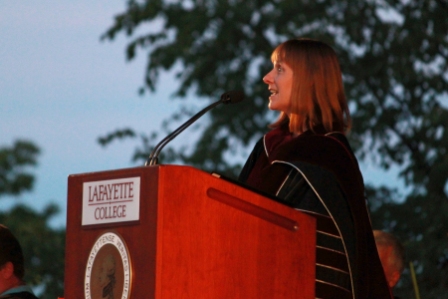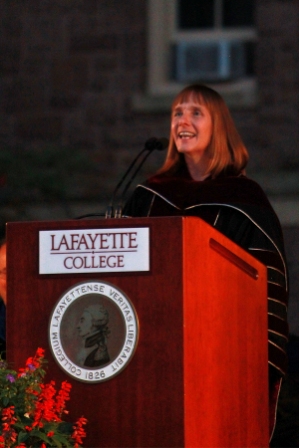Photos by Ally Hill ‘15| Photo Editor
President Alison Byerly started her convocation address to the class of 2017 much like any other collegiate president would.
“It is a great pleasure to gather together as a community to welcome the class of 2017,” she began. “Looking out at the crowd, it’s wonderful to see so many students, faculty, staff, and even a few alumni represented. The view from up here is really terrific.”
She paused before making her first impression on the matriculating class.
“In fact, I’d like to share it with all of you, so I’m going to take a quick picture, and send it out on Twitter.”
She held up her phone for a brief moment before lowering it.
“Gone,” Byerly said, and continued with her more traditional, formal address.
This quirky minutia of her convocation highlighted what is a rather unprecedented president. The first woman president in the history of the college steps into office needing to repair not only what some perceive to be a frayed relationship between students and the administration, but also decayed relations between the President’s Office and Greek Life.
Greek Life has been under fire in recent years. Three fraternities, Chi Phi, Phi Gamma Delta and Kappa Delta Rho, shut down on-campus activities during President Daniel H. Weiss’s tenure, and three of the current four are either on probation or have recently been taken off probation.
Byerly admits that Greek life is fighting hard to maintain their place on campus.
“When there are smaller numbers of fraternities and sororities, they feel defensive,” she said. “They feel embattled. I can certainly understand, looking at the history, why that is, but I think that my goal is not to see the administration at all as in opposition to them.”
She says alumni have spoken to her and expressed concern about the state of some of their more treasured traditions from their time at Lafayette.
“Many alums talk about Greek Life, et cetera, and what I told them was that the kinds of values that inspired their dedication to their fraternity are not only still represented but can be found in other aspects of residential life,” Byerly said. “If fraternities and sororities can meet the standards set up by the IAGGL process, I’m delighted to see them be part of that picture. ”
“I don’t believe Greek life is expendable,” she stated. “I believe if they adhere to the standards set, they have a place.”
Byerly has no administrative experience when it comes to dealing with fraternities and sororities. Her last post before arriving at Lafayette was at Middlebury College, where there have not been single-sex organizations since 1990. At the time of the decision, Byerly did not hold an administrative role; she was one year into her position as English professor.
She does want to see a shared sense of community at Lafayette as a whole, Greek life included.
“I don’t want to see this as Greek life vs. non-Greek life,” the president said. “But just as a part of the community in which all of these things are different options and they all work together and have shared values.”
The Twitter moment during convocation was an apparent ploy to connect with the students, and it sets the tone for what Byerly hopes to be a hallmark of her tenure: to establish a sense of connection with the campus population.
“I get a sense that students would like to feel closer to the running of the school, and I get the sense that they haven’t always felt close to the administration,” she said. “And, it’s not natural that students should feel close to the administration, per se, but I certainly feel like one of the things I will enjoy about being president is having a good relationship with students.”
She attempted to promote this desire during convocation by trying to establish new traditions, like displaying the sword of Lafayette during the ceremony or teaching the incoming freshmen the alma mater line by line.
“I get a sense that people would like to be more connected to traditions,” Byerly said. “The changes that I recommended for convocation, like using the sword, like teaching the alma mater, were meant to make it a little more interesting, a little more interactive. Obviously, taking the picture and tweeting it out was part of saying, ‘this is exciting for me too and we’re in this together.’”






















































































































